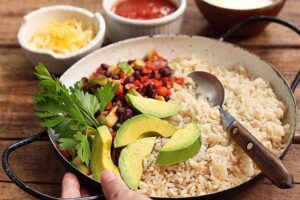
Our food’s ecological footprint
We hope that you enjoy reading our foray into all things food – we appreciate that not everyone wants to change their diet, but we thought we would give you some… 'food for thought'!
If you are looking for a way to make a meaningful impact on the fight against climate change, maybe it is time to look at what you are eating.
The food we consume has an ecological footprint, starting from the resources used to grow and transport it, through to its carbon emissions during production and disposal. By changing our diets, we can reduce our environmental impact and help combat climate change.
The effects of climate change on our environment
From droughts and floods, to extreme weather events and rising sea levels, the impact of climate change is being felt by people and ecosystems globally.
While the causes of climate change are largely anthropogenic (caused by human activity), everyone can play a part in mitigating the effects.
Meat and dairy production are responsible for a large percentage of greenhouse gas emissions, so reducing your intake of these products can make a big difference. What’s more, growing food organically helps to sequester carbon in the soil, which can further offset emissions.
Of course, dietary changes alone won’t be enough to solve the climate crisis, but they are an important part of the puzzle, and every little bit counts.
Greenhouse gas emissions in the food system
There are many things that contribute to climate change, but one of the most significant is the way we produce and consume food. The food system is responsible for a huge amount of greenhouse gas emissions: from growing, raising and transporting livestock, to producing crops, to packaging and distributing food. What we eat also has an impact on our climate. For example, meat and dairy products require more land and water to produce than plant-based foods, and they generate higher emissions, too.
Fortunately, there are a number of things we can do to reduce our impact on the environment through our diets:
1. Reducing your consumption of meat and dairy products can have a big impact. For example, if everyone in the U.S. ate just one less burger per week, it would be the equivalent of taking 10 million cars off the road per year!
2. Choose local, seasonal and organic foods. These foods have a smaller carbon footprint because they’ve travelled less distance to get to you and they’re produced without harmful pesticides or fertilisers.
3. Waste less food. It takes a lot of energy and resources to grow, process and transport food – so when we throw it away, all of those resources are wasted, too. Sadly, the UK produces the highest amount of food waste in Europe. The UK throws away around 9.5 million tonnes of food waste in a single year... even though 8.4 million people in the UK are in food poverty.
4. Compost your food scraps. This is a great way to reduce methane emissions from landfills, while also creating excellent compost for your garden.
Some tasty recipes to inspire sustainable eating
We thought it would be helpful to list some delicious and easy-to-follow recipes that will help you enjoy sustainable eating, without compromising on taste or nutrition:
1. Vegan spicy black bean soup with avocado: this hearty soup is packed with protein and fibre, making it a filling and satisfying meal. The avocado salsa adds a fresh and creamy touch, while the spice from the cumin gives it a kick.
2. Quinoa vegetable stir-fry: this quick and easy dish is perfect for busy weeknights. It's packed with nutrient-rich veggies like broccoli, carrots, and red pepper, and the quinoa provides a boost of protein.
3. Oven roasted cauliflower with tahini sauce: cauliflower is ‘having a moment’ right now, and for good reason. It's roasted to perfection in this recipe, and the tahini sauce gives it a delicious richness.
4. Vegan lentil Shepherd's Pie: This comforting pie is filled with earthy lentils and topped with creamy mashed potatoes. It's hearty enough to satisfy even the meatiest of appetites, but, rest assured, it's 100% vegan.
5. Sweet potato black bean enchiladas: these enchiladas are bursting with flavour thanks to the sweet potatoes, black beans, salsa, and spices. They're also super easy to make.
Alternatives to reducing meat and processes foods in your diet
There are a number of alternative diets that can help reduce your carbon footprint and fight climate change:
1. The Vegetarian Diet: this diet excludes meat and poultry, as well as fish and other seafood. Instead, it focuses on vegetables, fruits, grains, beans, and nuts.
2. The Vegan Diet: this diet is similar to the vegetarian diet, but it also excludes all animal products, including eggs and dairy.
3. The Flexitarian Diet: this diet is flexible – you can choose to eat meat and poultry occasionally, or not at all. The focus is on plant-based foods such as vegetables, fruits, grains, beans, and nuts.
4. The Pescatarian Diet: this diet includes fish and other seafood, but excludes all other animal products (including meats, poultry, eggs, and dairy).
5. The Mediterranean Diet: this diet emphasises healthy fats (including olive oil), fresh fruits and vegetables, whole grains, legumes, and fish.
Carl Dodd, Property Revolutions Ltd.

